|
By Anonymous
She’s the sweetest person I know. She supports her family, loves working with kids, and has a heart big enough to hold the whole room. So the first thing I asked myself was, how did she get there? How did my friend end up in an abusive relationship? The very first time I met him, he seemed nice, and she looked so happy. He was funny, kind, and able to get along with all of her friends. Our conversations were filled with stories of their dates and weekend getaways, with her sharing memories of her “best relationship yet.” She thought that she had finally found the one. Then something changed. He became rude and dismissive of her friends. I began to feel uncomfortable in his presence and started to wonder what she saw in him. Everything was different. Soon our conversations turned into rushed phone calls, our laughter into whispers, and her smile into tears. There were stories of him opening her text messages, deleting male friends from her life, insisting he know the passwords to all of her social media accounts, and demanding an explanation for every minute she was late getting home. I couldn’t understand why she couldn’t see that he was isolating her from her friends and family. At first I was okay being the friend that she confided in. The friend who would pick up her when he left her somewhere stranded while he rode around in her car, the friend who would let her spend the night when staying at home was just a little too scary, the friend who would drop her back off to where I knew she was being abused. She would say that everything was okay, but once she got tired of hearing the advice from everyone around her, she shut down and would only mention him briefly. I was okay with this for a while, as I thought it was better to not hear about it then to worry about her all the time, especially because I felt she knew better. I treated her like an accomplice rather than a victim. Then one night, I experienced his abuse first hand. We were riding in the car and she was upset because they had been arguing all day. She had left the house earlier and wasn’t answering any of his phone calls. Suddenly, she looked down from the rearview mirror with a look of fear on her face before saying, “He’s following us”. As she began to speed up, I could see him right behind us. I can’t explain how I felt in that moment; I was scared, worried, and horrified at what my mind thought he was capable of. She was calling her mom, and I was calling the police. It only took us 7 minutes to get to the police station but it felt like 30. He followed us all the way there, pulling up beside the car, yelling for her to roll the window down, running red lights, and driving over medians in the middle of the road just to get to her. After she told the police that she didn’t want to press charges, I was so angry with her that we went weeks without speaking. I didn’t understand how she could still want to be with someone that would put her life and my life in danger. I had never been in a situation like that before and I was angry at her for putting me in it. It took me a while to realize that my friend was in a relationship that she had no control over and that she needed my support, not my judgment. I thought about how scared I was that night in the car and knew that if I felt that way then her fear was ten times greater. She was the one who had to deal with him every day. She was the one in love with a guy she barely recognized, and now she could barely recognize herself. My other friends and I made it our mission to be there for her whenever and wherever we could. It was more important to be by her side during this battle then to force her to end the war. We only had an objective view into her world and asking her to leave was clearly a lot harder than we thought. With our help, the support of her family, and various resources in the community, she was able to leave him. It didn’t happen overnight, but over time she was able to rebuild her self-esteem, reduce her anxiety, and start living again. Please remember that intimate partner violence is a real issue and affects many women. Your friends may become angry or defensive, but they know that their safety and well-being is your primary concern. Work with them to find the appropriate resources to get them the help they need. By Christine Murray, See the Triumph Co-Founder
A safety plan is a basic tool that victims of domestic violence can use to identify risks to their safety and well-being and plan strategies for protecting themselves in the face of those risks. A couple years ago, my Family Violence Research Group at the University of North Carolina at Greensboro developed the Safety Strategies: Safety Planning for Survivors of Domestic Violence and Their Children booklet as a resource for professionals to use to conduct safety planning with their clients who face domestic violence. Our goal was to use the information we learned through our research with professionals working with 9 domestic violence agencies to present a comprehensive, practical approach to safety planning. Ideally, safety planning is done with professionals who have experience working with victims and survivors, because they are trained to help survivors identify the most pressing risks and helpful strategies to reduce those risks. If you or someone you know is currently experiencing domestic violence, I recommend you reach out to the National Domestic Violence Hotline (http://www.thehotline.org/; 1-800-799-7233) and/or a professional in your local community to walk through the process of developing a safety plan that reflects your current circumstances. Based on the Safety Strategies booklet, we offer the following safety planning suggestions to help people who are currently facing safety risks due to a current or former abusive relationship:
10/23/2014 0 Comments I'm Alive Today Because Of My FriendBy Claire Cappetta, See the Triumph Guest Blogger October is here once again, the leaves turn gold and red hues, and the sun is struggling to make its once heady heights in the sky as it did in summer, casting long shadows on the ground. This time of year brings back memories for me of how I survived, as it was this time 18 years ago that I was amidst selling my house and organizing my new life to start afresh. I had ended a relationship due to many reasons. I found out that not only was I fully supporting him financially, but he had cheated on me, as well as several other reasons. He didn’t accept it. He held me hostage, threatened to kill both myself and my children. I turned to family, asking for help. I told them I had been given an opportunity to start afresh, but my plea fell on deaf ears. There were only two people who could hear me: the policeman who was assigned to my case after I called to ask them what I should do, and my closest friend, Chrisie. Chrisie gave me the strength to call the police. She knew some, but not all, of what I was facing. Out of all the people I knew who could have even just listened and heard how traumatic life had become, she was the only one who could hear me. She knew my ex-boyfriend and, in fact, was a member of his family. She stood by me when the police were trying to convince me to have my ex-boyfriend arrested for stalking and harassment. That day, I completely broke down after hearing that one of the policemen had released him. They had let him just go home after I had found the strength to say, “Yes! Take him and arrest him!” One evening, he pushed his way back into my home, knowing my friend was due to arrive soon. I had warned him with a simple, “You need to leave, Chrisie’s coming!” When she did arrive, his car had already been noticed, parked 10 yards down the road, as it was every night. He slept, ate, and lived in his car for four months. I believe he may have had a change of clothes and a shower twice in the time he called his car home. He had lost weight, he looked drawn and haggard. His eyes had become dark, sunken, desperate, and depressed. There was nothing I could do to help him. The police told me he had become fixated and was now a danger to me and my children. That evening, Chrisie grabbed him, dragged him down my hallway, shouting at him not to return. We both knew he would. He was arrested, finally around Christmas time, under a new “Harassment Law” that was brought in to power in 1996. I also was given an Order of Protection, meaning that he couldn’t come near me or drive down the road I lived on. I had very quietly sold my home, packed my belongings, and organized my children for the move. I was making the big push to a “normal” life, sanity, and freedom. We needed to survive. I had told someone close that he had threatened to kill us. What was their response? “At least your graves will be nearby and we can visit,” they said with a smile. Moving day arrived. A truck parked outside my house as we loaded my life into it. I collected my children from school and picked up a rental car so I could leave mine outside, hoping people wouldn’t know I had left for a couple of days. I needed everything to “look” normal. That didn’t work. He had passed my house and seen the truck. When I walked into the house to collect the remaining bags to take in the car, the phone was ringing. It was my friend, screaming at me to get out and leave. She told me he had seen the truck, and he was getting a weapon to come back and kill us. We had fifteen minutes… We left, immediately! I think back now each October of how a friend saved my life. She is a wonderful, beautiful, kind, loving friend. Without her friendship, I would not be here today. We lost contact over the years, but two years ago, we found each other again, 16 years later and 3,000 miles apart. I dedicated my second book to her, she will always be my friend, my hero, and the one who--if she hadn’t been there then, in my life--I wouldn’t be here today. Please remember those struggling to survive, to stay alive. I’m alive today because of my friend. She heard me. We do our best to raise awareness every October, but we need to continue this message all year round. You never know if by listening, believing, and helping, you too could save someone’s life.  Claire is the author of A Broken Ring ~ A journey of Empowerment and Stalking Liberty ~ Are you safe?..., (Parts One and Two of the Ride to Liberty Trilogy). Born and raised in Yorkshire, England, she recently retired from the financial world to concentrate on writing her personal journey through relationships, child abuse, rape, domestic violence, through to healing and empowerment. Although at times heartbreaking it shows healing is possible. The story is heartwarming and inspiring. She now lives in New York with her husband and step-daughter, while her two grown children live in England. 10/21/2014 0 Comments What If Your Friend Is An Abuser?By Christine Murray, See the Triumph Co-Founder
All this month, we’ve been focusing on how to help a friend who’s involved in an abusive relationship. At See the Triumph, our main goals are to challenge the stigma surrounding abuse and to develop resources to support survivors. Because of our focus on survivors, our main aim for the month has been to address ways that people can support a friend or loved one who’s being abused. However, people also may not know what to do when a friend or loved one is the one who is perpetrating the abuse. So, today, we’re focusing on steps you can take if you know or suspect that a friend or someone else you know is being abusive toward their partner. Every situation is unique, so just as advice for helping a friend who is being abused is impossible to generalize to everyone, the same holds true for addressing a friend who is perpetrating the abuse. Therefore, think carefully about the specific details of the situation, and you may benefit from speaking with professionals in your community--such as at your local domestic violence agency or law enforcement officials--before taking any action. As I emphasized in my posts on helping survivors, avoid taking any actions that could put yourself into harm’s way. Remember to care for your own safety at all times, as well as the safety of others. Assuming the person trusts and respects your opinion, you have an opportunity to send some powerful messages that could encourage them to stop the abuse. Some of the important messages you can say and convey in other ways are as follows: Message #1: “The abuse is wrong.” Don’t laugh off the abuse or lead them to think that it’s okay that they’re using abusive behaviors. If you don’t feel comfortable saying anything to them, consider the possible impact of your silence. Be mindful that the person may think that, because you haven’t said anything, you think it’s okay or normal for them to treat their partner that way. Make sure, through both your words and your actions, that you make clear that you do not support the abuse in any way. Message #2: “You are hurting your partner.” It’s all too common for abuse perpetrators to try to minimize or deny the extent of the abuse. For example, they may say things like, “It was just a little slap across the face,” “I didn’t really hurt her/him,” or “They’re just too sensitive.” You can play a role in holding the person accountable for their actions by pointing out the actual impact of the abuse. If that “little slap” left a black eye, remind them of the severity and say that you think it was a bigger deal than they’re making it out to be. If they deny the impact of their abuse on their partner, point out other changes you’ve seen, such as if their partner has become more sad, withdrawn, or quiet recently, as well as if you’ve noticed other problems that the abuse is causing. If they claim that their partner is just being “too sensitive,” you can talk to them about how you think they’re responding in a normal, expected way to being abused. Message #3: “There are other negative consequences of the abuse.” I’ve heard it said that people abuse their partners because they can. This means that many people likely use abusive behaviors in their relationships because they get rewarded for it (e.g., by maintaining power and control over their partners) and often get away without any form of punishment. When the rewards outweigh the punishments, there is likely very little motivation for people to change their abusive behaviors. Therefore, it’s important to remind abusive partners of all the negative consequences they’ve already faced--and could face in the future--if their abusive behaviors continue. Of course, one of the major negative consequences is the hurt they are causing to their partner. Realistically (and unfortunately), this may or may not be a motivator to get them to change their behaviors, so it can be helpful to discuss other possible consequences they may face. This may include any combination of the following: hurting any involved children, risking getting arrested and going to jail, risking their career if they face legal consequences, other financial consequences related to legal sanctions (e.g., legal fees and costs of attending a batterer intervention program), losing relationships with friends and family members, and the embarrassment, tarnished reputation, and loss of standing that may occur if other people find out about the abuse. Message #4: “You are responsible for your own actions. You are also responsible for doing whatever you need to do to change them.” We’ve heard so, so many times in our research that survivors of abuse were blamed for their abuse by their partners and others in their lives. Victim-blaming perpetuates the abuse by attributing the responsibility for changing it to the person with the least control over doing so. If you talk with someone who is abusing their partner, they may say something like, “Well, I wouldn’t do it if she didn’t…” or “He had it coming with the way he was acting.” Unless you think it would be unsafe for you to do so, I encourage you to challenge these statements and make clear that it’s not the fault of the victim. Regardless of what the other person may or may not be doing, each person only has control over their own behaviors. Remind them of their own responsibility for stopping their abusive behaviors and for taking the steps needed to make this change. Message #5: “There are resources available to help you stop abusing your partner.” In most areas in the United States, there are court-sanctioned batterer intervention programs that are designed to educate and support people to change their abusive behaviors in intimate relationships. In many cases, these programs are also open to clients who are voluntarily seeking help. If you don’t already know whether this program exists in your community, contact your state domestic violence coalition to find out what resources are available near you. Other professionals--such as mental health professionals--may be able to provide support, although it’s important to find someone who is specially trained to address intimate partner violence. Keep in mind that, in general, couples therapy is not advised when there is violence present. So, if your friend suggests that they want their partner to go in for treatment with them, you can suggest that they seek an individual intervention first. They also may suggest that they’re being abusive because of a substance abuse problem or a mental health disorder. If you hear this, you can tell them that substance abuse or mental health symptoms are not an excuse for violence, and it’s important for them to seek specific treatment for each issue. While it’s true that many people who are abusive in relationships are hesitant to seek help on their own (and therefore most clients in batterer intervention programs are often court-mandated to be there), there are resources available to help people change their abusive behaviors, and you can help your friend locate and access these services in their community. Message #6: “If you do not stop abusing your partner, I will….” Where will you draw the line? At some point, you may face a decision to take action to try to stop this person’s abusive behaviors, even if it could mean hurting your relationship with them. For example, you may witness a severe act of physical violence. Will you call the police to report it? Will you cut off your relationship with them and lend your support to their partner? Of course, any decision you make should take into account their partner’s safety, as well as the safety of any involved children and yourself. Make no mistake: These decisions can be extremely complicated, especially depending on the nature of your relationship with them. Maybe they’re your best friend since childhood. Maybe they’re a coworker you work closely with. Maybe they’re your child or another close family member. You may or may not even know their partner very well. There can be an overwhelming desire to maintain the relationship or show support for the person you care about, even if they are doing really harmful abuse to their partner. At some point, I encourage you to ask yourself, “If I’m not taking action against the abuse, am I actually helping to perpetuate it?” You may feel like you have limited options of ways to stop the abuse, support the survivor, and hold the perpetrator accountable. And, indeed, in many cases, these options are very limited. But, if you know someone who’s being abusive in their intimate relationship, I encourage you to take action. By taking a strong stand against the violence, you have the opportunity to send important messages to the person that the abuse is harmful, it is their responsibility, and they can choose to change it and get help to do so. 10/18/2014 0 Comments Step 5: Tell Them That They Deserve To Be Treated With Dignity, Respect, and LoveBy Christine Murray, See the Triumph Co-Founder
When someone you care about is being abused, there are many practical ways you can provide support. As we’ve discussed in the previous blogs in this series, these ways may include asking them what help they need, helping them to connect with resources in their community, and taking action to promote their safety. These are all really important and meaningful ways you can potentially help someone who is being abused. Our fifth step in how to help someone you know who is being abused is just as important, and it's something that virtually anyone can do. It requires no special training or knowledge about intimate partner violence. All it requires is a genuine intention to support and build up the person you care about. To put Step 5 in context, let’s consider what life is like for many survivors of intimate partner violence. Not only is there often physical and/or sexual violence, but abusive people often regularly attempt to tear down, humiliate, blame, manipulate, and control their partners. Imagine being on the receiving end of this. Perhaps every day (and maybe even multiple times a day), you are told you are worthless, ugly, or stupid. You are told that you are bringing on your own abuse because you do “everything” wrong. Your feelings, needs, and opinions don’t matter, and you likely have no say in many of the decisions that impact your daily life. You’re told that you’re not allowed to make dreams for the future, and, indeed, you may become hopeless and feel that things will never change. Is it any surprise that we heard from many survivors who participated in our research that their self-esteem became completely diminished over time? What's the antidote to the disparagement that survivors face through abuse? One powerful antidote is a strong network of friends, family members, professionals, and others who provide consistent reminders of the survivor’s value and worth. Wouldn’t it be amazing if, for each disparaging action or word that a survivor received from their abuser, they heard at least ten positive, affirming messages from others? What difference would it make if every time they heard, “You’re worthless,” they could draw upon the many times they’ve heard from others:
We may never be able to silence the cruelty of some callous abusers. However, we can drown their cruelty with the powerful forces of love and respect. By Christine Murray, See the Triumph Co-Founder
What can you do to help someone in an abusive relationship become more safe? As I’ve discussed in the first 3 blogs in this series, important considerations in answering this question for a person in your life are:
At the most basic level, safety planning means identifying potential safety risks and actively and intentionally planning ways to reduce the risks they present. Of course, there is no absolute way to guarantee safety when there’s an abusive partner in the picture. However, through some basic safety planning, a survivor can develop practical strategies to promote their own safety and minimize the risks they face. Although Safety Strategies was designed to be used by professionals, it contains several examples of the types of safety strategies that can be used to address some of the major risks that survivors face in abusive relationships. We learned about these risks and the strategies to address them in the focus groups we conducted. Based on the Safety Strategies Guidebook, the following actions are examples of the general strategies that could potentially be used to help promote safety in the context of the some of the risks involved in an abusive relationship. The word potentially is important to highlight, as each person’s situation is unique, so it’s important to consider whether each particular strategy would be relevant, safe, and appropriate for each person. Risk: Leaving an abusive relationship Sample safety strategies:
Sample safety strategies:
Risk: Keeping children safe in the context of parents’ abusive relationships Sample safety strategies:
Sample safety strategies:
Risk: Enforcing a domestic violence protection/restraining order Sample safety strategies:
Sample safety strategies:
When it comes to supporting someone in an abusive relationship, remember this: Think Safety First! There are many practical steps that you can support your friend in taking to increase their safety and address many of the risks they face. By helping your friend identify these steps, you can help them to feel empowered to know that, even within their abusive relationship, they have options and can take action to become safer. By Christine Murray, See the Triumph Co-Founder
When helping a loved one who’s in an abusive relationship, it’s important to know, honor, and protect your own limits--including your emotions, knowledge, and physical safety. In today’s post, I’ll explore each of these and suggest strategies for times when you reach your limits. Taking Care of Your Emotions Abusive relationships can be emotionally exhausting for everyone involved, including friends and family members who offer their help and support. First and foremost, knowing that someone you care about is being hurt can be very sad. You care for them, and so of course you want to see them happy and being treated with love. In addition to sadness, you may be scared for their safety. Maybe you’ve seen what their abusive partner has done to them in the past, and you’re afraid that it could be that bad--or worse--again. Confusion can be another powerful emotion when you’re trying to help someone involved in an abusive relationship. Your confusion may stem from difficulty understanding how the abusive partner can be so hurtful, why your friend is staying in the relationship, or what your role in the situation should be. The situation can change on a daily--if not hourly--basis, and so you may find yourself questioning what is happening, even if you’re very close to the situation. In light of all the emotions that can arise when helping a friend who is being abused, you should think not only about their emotional needs, but your needs as well. Don’t hesitate to reach out for help to manage your own emotions related to the situation. You can benefit from talking with a friend, family member, or even a professional counselor. Engage in other healthy coping strategies to help you manage the stress and emotions you may experiencing. For example, you may benefit from getting physical exercise, practicing yoga or meditation, journaling, or drawing upon your religious or spiritual beliefs to help you cope. Many people who want to help a friend who’s being abused face a risk of burnout, as the process of ending an abusive relationship and getting safe can be long and tumultuous. Therefore, in order to best support your friend in the long-term, it’s important to make sure you’re also taking good care of yourself in the process. Recognizing the Limits of Your Knowledge Unless you’re professionally trained to help people who are being abused or you’ve had some other form of training or experiences to help you understand the dynamics of abuse, it’s likely that there are important pieces of information that you don’t yet know that would help you best to support your friend. And, honestly, you’re not alone! Even many professionals who work with victims every day encounter situations in which there are no clear answers as to what actions are best to take to help the person be safe. The truth is, when it comes to abusive relationships, there are very few easy decisions to make! Rest assured--there is help available for you to know how to help your friend! You can call the National Domestic Violence Hotline (1-800-799-7233; TTY: 1-800-787-3224) or your local domestic violence program to ask for assistance in knowing what steps you can take to help your friend. Most likely, you’ll be able to receive confidential help and ask for advice without disclosing your friend’s name. You may or may not even tell your friend that you called, depending on the nature of the situation. If you feel that your friend needs help beyond what you can offer, you can help them to locate services and resources in their local community. If you don’t already know which community resources are available, you can contact your state domestic violence coalition to ask for their assistance. If ever there is an immediate danger, call 9-1-1 or the local emergency hotline to connect with emergency responders. In addition to all of the challenges that your friend is facing in the abusive relationship, navigating community service agencies can be overwhelming and frustrating. Therefore, one of the critical ways you can help them is by supporting them as they navigate these systems and learning about other resources available to promote their safety. Maintaining Your Physical Safety Violence in an abusive relationship can spill over to other people, so it’s important to take steps to promote your own safety if you’re helping a friend who’s involved in an abusive relationship. Ask your friend if they know if their abuser has ever made threats to hurt other people. In addition, ask if they know if their abuser has access to weapons, especially firearms. Be sure to consider your own safety when you consider ways to help your friend. For example, your friend may need a place to stay after leaving the relationship. When deciding whether to do this, be sure to consider if this will be a safety risk for you and anyone else who lives in the house. Be especially cautious if the abuser has threatened to hurt you, if they’re stalking or following your friend, and/or if they have access to lethal weapons. If you think that housing your friend would pose too great a safety risk, then you can help them to locate other sources of safe shelter, such as a domestic violence shelter, a hotel room, or another friend or family member who lives somewhere unknown to the abuser. Use similar precautions for any other action that could potentially put you in harm’s way. When safety threats are imminent, I urge you to report them to law enforcement, and please use extreme caution before involving yourself in any situation that may pose a risk to your own physical safety. Again, you can reach out for support to your local law enforcement agency and/or a local or national domestic violence hotline in order to think through how best to protect your own safety while helping your friend. When helping a friend who is being abused, it’s important to know your limits and protect your own emotional and physical safety. When you reach your own limits, know where you can turn for additional help, information, and support. Remember the old adage: “You can’t help others until you help yourself.” You’ll be in the best position to help your friend if you come to the process from a calm, strong place. Self-care is a critical component of being able to help others. By Christine Murray, See the Triumph Co-Founder
It sounds simple, doesn’t it? If you’re trying to figure out how to help someone, just ask them what they need. However, when it comes to wanting to help someone you care about who’s involved in an abusive relationship, this question can be difficult to ask for many reasons. You may be afraid of offending them. You may feel like it’d be best to mind your own business. Or, you may have tried to help them in the past, only to have your help not be received in the way you intended. Despite these challenges, an important step you can take to help someone you know who’s being abused is to ask them what types of help and support they could use from you. Be prepared: their answer may surprise you, and it may not be the kind of help that you think they need. For example, you may think they need help leaving the relationship, whereas the help they ask for is for you to babysit their child while they go to a job interview. Of course, it’s up to you if you’ll be able to provide the kind of help that the person asks of you. But, I encourage you to trust their judgment to know what kind of help they need in any given moment. You may not understand how the job interview is connected to their safety, but perhaps they’re seeking that job so that they’ll be better able to survive financially if they ever decide to leave. Sometimes, you may ask how you can help, and the other person will say that they don’t need or want any help from you right now. This can be very frustrating to you, especially if your perspective is that they need a lot of help. If you find yourself wanting to force your help or advice on the person, resist this urge! A much more helpful approach is to let them know that you’ll be there for them if and when they ever do need your help. This leaves the door open for the person to seek your help at another time, and it also avoids disempowering the person by telling them what to do. There are some situations where you may need to take some action to address an abusive relationship situation, even if the person you’re helping doesn’t want you to intervene. These may include the following:
Ultimately, the power of asking what kind of help the person needs lies in trusting their judgment, as well as honoring their choices and expertise to make choices for their own life. This empowerment approach is fundamental to the way that many domestic violence service agencies operate, and it’s useful to adopt in helping a friend as well. Asking how you can help may seem like a simple task, but it requires courage, patience, and compassion. By offering to help in a way that is most meaningful to them, you send a powerful message that their needs and decisions are important, and that help is available if and when they need it. 10/11/2014 0 Comments Step 1: Remain Non-Judgmental (How to Help a Friend in an Abusive Relationship)By Christine Murray, See the Triumph Co-Founder
Imagine you’re on the outside of an abusive relationship, looking in. Suppose the person being abused is someone you know and care about. You’ve probably witnessed or heard about the way their partner treats them. Maybe they’ve even come to you for help, and you offered your advice and support, and then you were upset when they returned to the relationship. You’re confused and frustrated because you don’t understand their choices. It may be tempting to look at the person being abused and wonder things like, “What are they thinking?” or even, “What is wrong with them that they’d stay with their partner when they’re getting treated so terribly?” But now, imagine, for a moment, that you are the one who is being abused by your partner who supposedly loves you. You probably still love them, or at least you loved them at one point. If you’ve been together for a long time, you share many aspects of your life with that person--maybe you have children together, or you own a house together. You may share friends, hobbies, a social circle, and even dreams for the future. You have some good memories of happy times you’ve shared, and it’s hard to imagine life without your partner. And still, this person hurts you. Maybe not all the time, but they’ve hurt you--whether physically and/or emotionally--in ways that you know, at least on some level, are not right. You may fear for your safety if you stay with your partner, but they also may have threatened to hurt you even worse if you leave. Not only are you afraid of what your partner may do to you, but you’re also scared of the other consequences you could face if you ended the relationship--which might include living in poverty, losing time with your children, and losing friendships. Just how different is the view from the outside, compared to the inside, of an abusive relationship? From the outside looking into an abusive relationship, it can be tempting to judge a person who is staying with someone who is hurting them. However, from the outside, it’s nearly impossible to know the full story of how that person thinks and feels about their relationship, as well as their reasons for staying with their partner. For this reason, our first suggested step to helping someone who is involved in an abusive relationship is to try your hardest to avoid judging that person and their decisions. I know this is not easy. In fact, it can be extremely difficult. It may even seem impossible, especially if you're emotionally invested in the person who is being hurt. Not only can it make you feel confused because you don’t understand their reasons for staying, but also you may feel sad and scared, as you want that person to be safe and respected. I have never met, or even heard of, an abused person who actually wanted to be abused or did anything to “deserve” being treated that way. I can tell you this based on my experiences as a counselor, as well as through our research with hundreds of survivors, in addition to my experiences teaching, doing trainings, and numerous other work and volunteer experiences through which I’ve interacted with people who had personal and professional experiences related to intimate partner violence. Of course, I have known people who were being abused who didn’t want their relationships to end, but they always wanted the abuse to end. Always. Their reasons for wanting to remain in their relationships were diverse. When we begin to fully appreciate the complexity of people’s lives, we can see that very rarely are there clear-cut, easy answers as to whether a significant intimate relationship should end or continue. Even when the answer seems simple, the steps required to end that relationship can be very, very difficult. In some cases, those steps are life-threatening. Therefore, we suggest that the first step to helping a person who you know or suspect is being abused is to approach the situation and the person with a non-judgmental, supportive perspective and an open mind. Any judgment that the person perceives from you could lead them to turn away from you and view you as unhelpful, regardless of how positive and supportive your intentions may be. Three statements you can make to remind yourself to remain non-judgmental are: * “I don’t know the whole story.” * “I have no idea how I would respond if I was in this person’s exact same situation.” * “I can best help this person by supporting them, not judging them.” Although this is the first step we suggest, we know it may be one of the most difficult. However, it is also perhaps the most important step in being able to help and support someone who is being abused. By providing a supportive, nonjudgmental presence for that person, you can provide a powerful statement about how important it is to understand and honor their value as a person, as well as their unique perspective on their situation and relationship. By Sara Smith, See the Triumph Guest Blogger Many people struggle with how to help a friend or other loved one who is in an unsafe, abusive relationship. Talking to a friend who you are worried about can be daunting. The fear of interfering, being wrong, or possibly driving them away can keep many people from reaching out. If you are concerned for someone’s safety in a relationship, you can turn to many available resources that may help you start the conversation. According to Domestic Abuse Intervention Services (2014), some important things to consider when talking to a friend include the following:
There are some important things to try to avoid when helping a friend. These include the following:
You don’t have to be an expert to help someone who is in an abusive relationship. What’s important is to show them that you’re concerned and deeply care about the happiness and safety of your friend. That is important enough. Be there when they need support, and help them reach out to support systems and resources as they are ready. If they’re not ready to hear you or are not ready to leave, make yourself available to be there when they become ready. Remember to be patient. Stay calm, arm yourself with knowledge and resources, and good luck in supporting your friend or loved one in becoming another survivor! References:
 Sara Smith is currently pursuing a Master’s of Science in Clinical Mental Health and Couple and Family Counseling. |
Archives
July 2024
CategoriesAll About Intimate Partner Violence About Intimate Partner Violence Advocacy Ambassadors Children Churches College Campuses Cultural Issues Domestic Violence Awareness Month Financial Recovery How To Help A Friend Human Rights Human-rights Immigrants International Media Overcoming Past Abuse Overcoming-past-abuse Parenting Prevention Resources For Survivors Safe Relationships Following Abuse Schools Selfcare Self-care Sexual Assault Sexuality Social Justice Social-justice Stigma Supporting Survivors Survivor Quotes Survivor-quotes Survivor Stories Teen Dating Violence Trafficking Transformative-approaches |
Search by typing & pressing enter


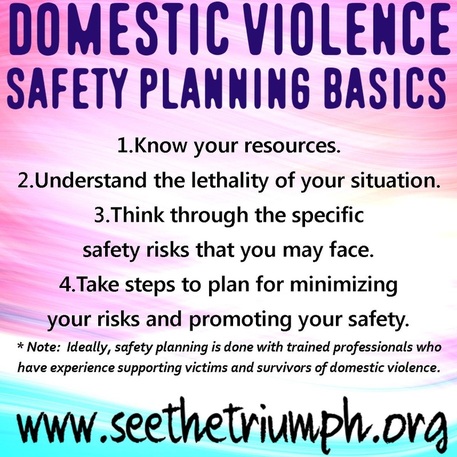
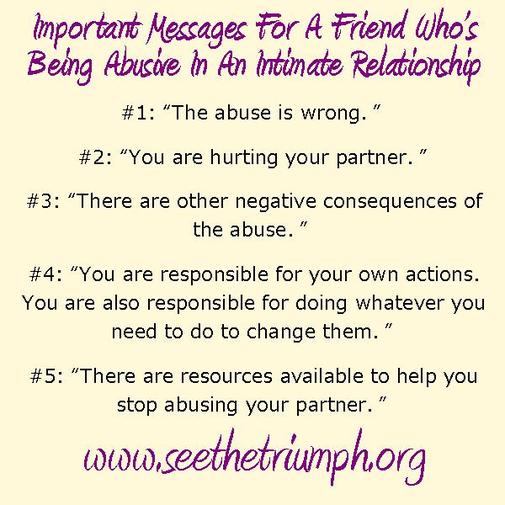
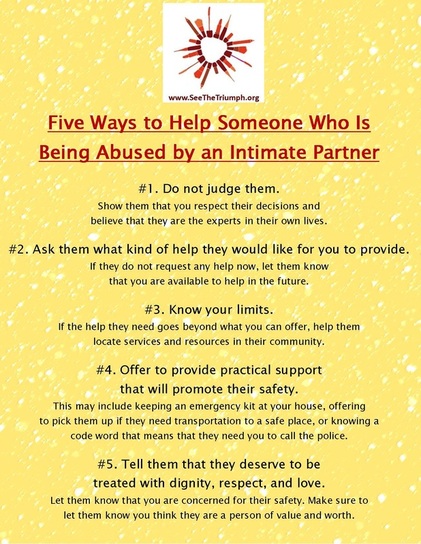
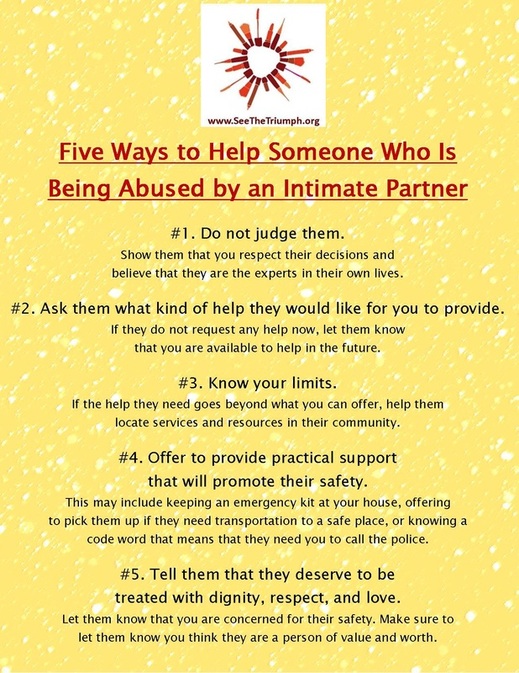
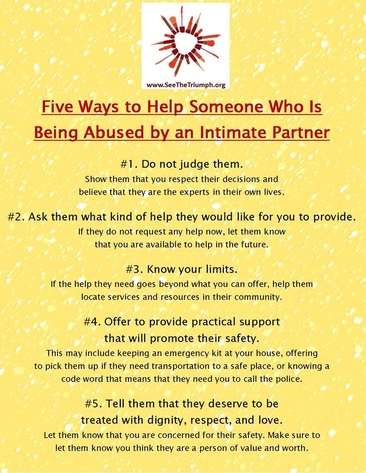
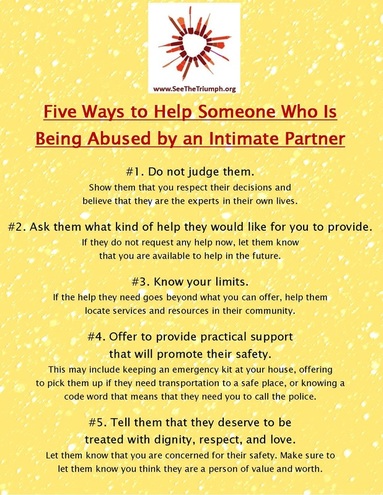
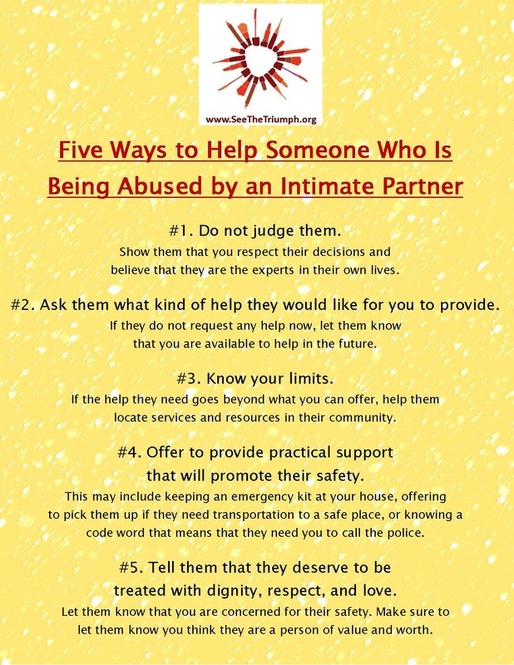
 RSS Feed
RSS Feed